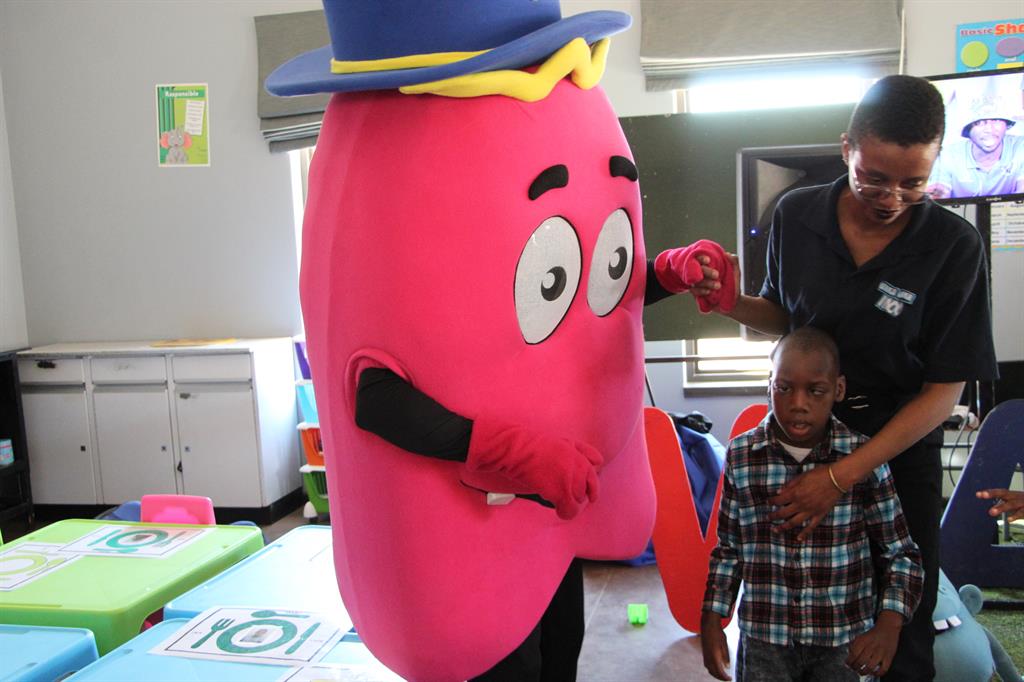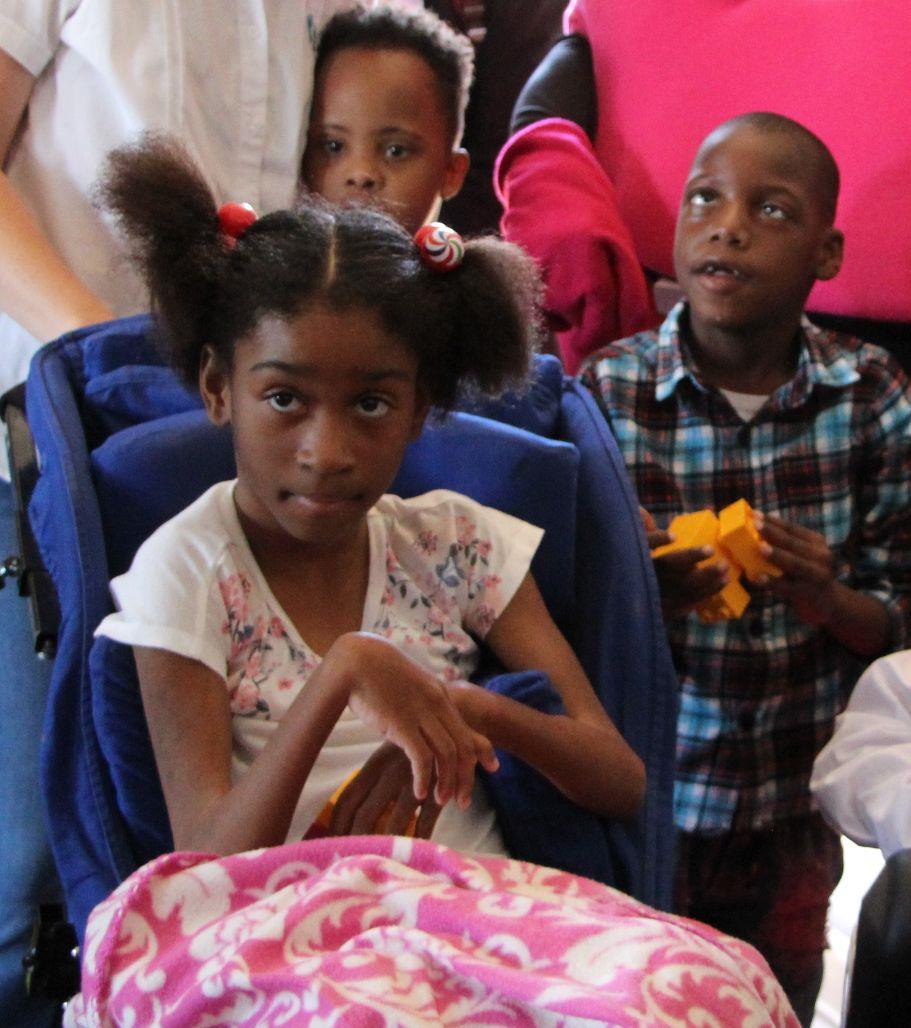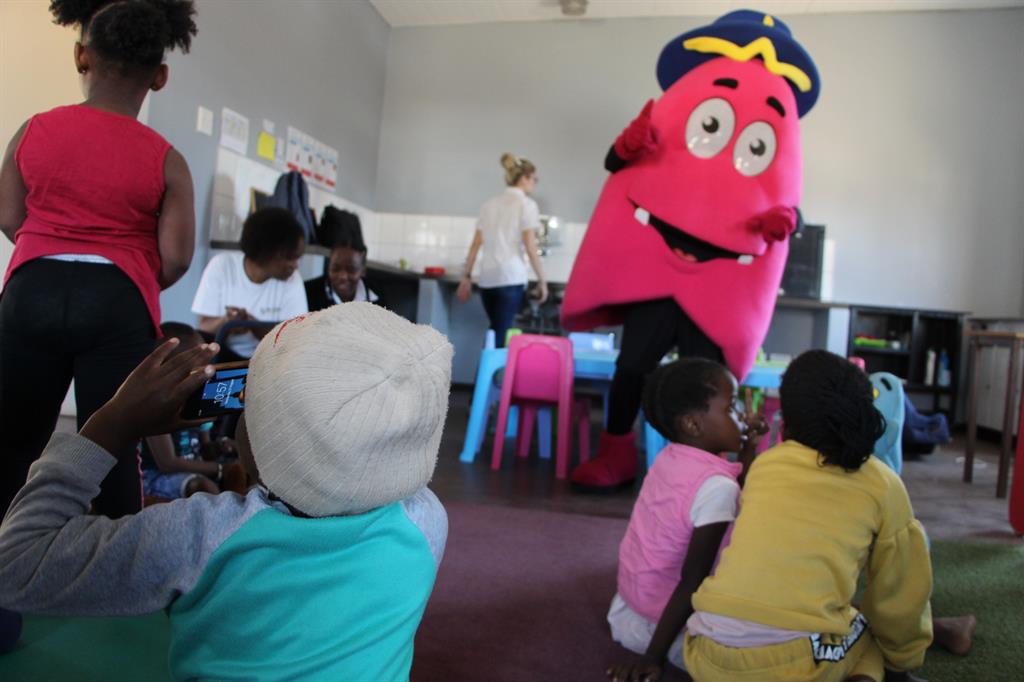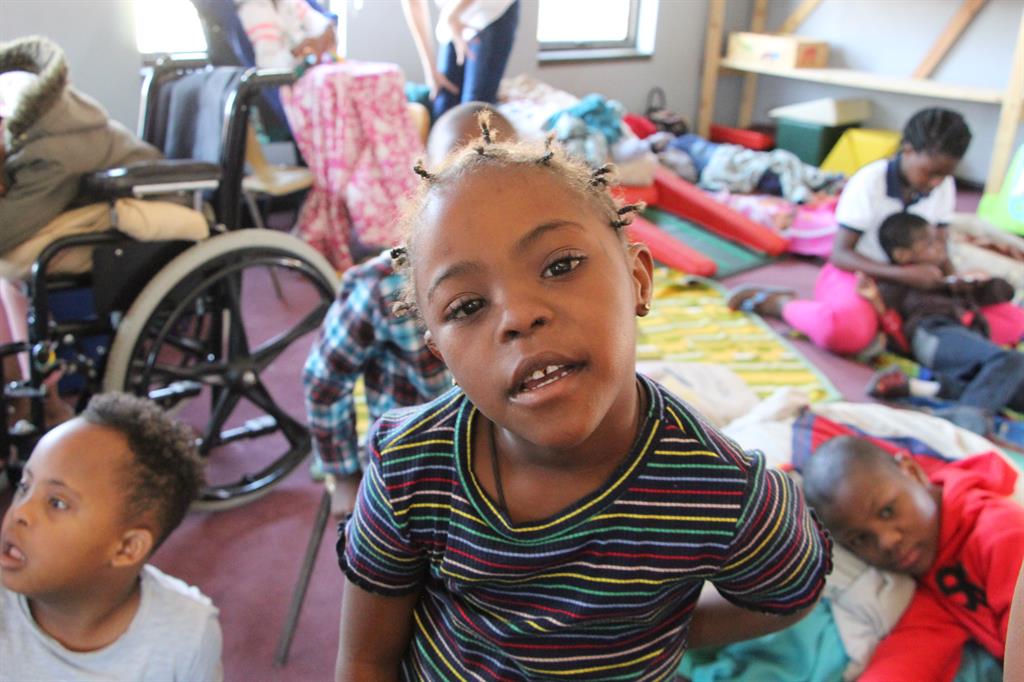Inclusivity is key
Removing barriers faced by children with special needs
Mariselle Stofberg
The Covid-19 pandemic has greatly impacted education throughout not only Namibia, but the world. School calendars have been disrupted and curriculums had to be adapted. Schools that cater to children with special needs have experienced this impact even more.
“Some of the children with special needs are raised by guardians who are unemployed, compromising the support services that they are entitled to receive,” says Inge Katjiuongua, a senior education officer for inclusive education at the ministry of education, arts and culture head office in Windhoek.
“Accessibility to schools is hindered for some children because there is no transport to get to and from schools especially in towns, cities and rural areas where schools are far from them. In the sandy areas of Namibia, some learners who use wheelchairs find it difficult to move around the school,” Katjiuongua adds.
Katjiuongua says that in terms of teaching and learning, some learners do not have assistive devices that are required to help them in the learning process.
“The ministry has limited staff who are responsible for assessing and diagnosing learners with learning and intellectual disabilities, making it difficult for teachers to understand the disabilities they are dealing with in order to help them come up with strategies to support the learners,” she adds.
Katjiuongua says that not all teachers are equipped to handle and teach children with special educational needs during teacher training and as a result quality education for such children is compromised.
Challenges faced by learners
“As we all know, our learners attended school for approximately two months before face-to-face classes were suspended due to countrywide lockdowns and regulations. This means that learners in pre-primary, grade 1 or orientation and beginner’s phases, in the case of special schools of learners with intellectual impairment, were physically in class for two months this year. Whatever skills, such as literacy, numeracy, self-care, social or motor etc., they developed when they were in class will be forgotten by the time classes resume,” Katjiuongua adds.
She says it will be a mammoth task for teachers to re-teach such skills needed for learning when they return to face-to-face class teaching.
“Most of the children do not have smartphones, making it difficult to communicate with them and those children with severe disabilities cannot use those devices on their own.”
The different lockdown locations of learners made it difficult to reach them, and even though booklets were sent to learners through courier services, Katjiuongua says that tracking their progress via WhatsApp was a challenge.
“E-learning can only accommodate the learners whose parents can afford gadgets such as smartphones, tablets and laptops. While teachers send the booklets to the children with disabilities, it’s observed that some parents can't read or write, making it difficult for them to support the children in completing the tasks,” she says.
The ministry also introduced basic pre-vocational skills course for senior learners who could not cope in the academic stream and offering technical subjects through the e-learning platform is a challenge since 65% of the work is done through practical work and only 35% is theoretical.
Programmes and initiatives
Through the ministry’s Division Special Programmes and Schools (DSPS), the ministry has engaged all schools that are catering for learners with special educational needs. This includes inclusive, special and resource schools and units and learning support classes, to assess as to how learners are coping with the continued learning during Covid-19 challenging time.
“Schools have indicated activities that they have initiated, their strengths and weaknesses as well as their needs for continued learning. The support system is decentralised for every region to work out a mechanism to support learners, while the national head office continues to support the regions with funds and other teaching and learning materials.”
The ministry has also distributed masks and hand sanitisers to all schools as part of the prevention measures.
Katjiuongua adds that some schools that accommodate learners with disabilities conducted surveys to find out how the majority of learners can be reached and radio was regarded as the main mode of communication the majority of households owned.
“In response to that, schools used it to inform parents on important issues. Learners’ booklets of different grades and phases were distributed through newspapers that were dispatched to all circuits. Some schools printed work books which were couriered to the learners, while some parents came to schools to collect the booklets,” she adds.
Learning materials are printed in Braille for children with visual impairment, while sign language is used in verbal communication with hearing-impaired students.
A video to create awareness on Covid-19 has been developed for all deaf learners, though Katjiuongua says that adults can benefit from it as well. “The video was shared with the schools and also shown to some deaf learners to raise awareness and also to teach new vocabulary related to Covid-19 in sign language and written English.”
WhatsApp platforms for teachers responsible for learning support classes are being used for sharing tasks, homework and attending to enquiries. Other WhatsApp groups are created per grade to send links, worksheets and daily activities to parents.
“Booklets are collected by the parents, especially for those who do not have access to the online platforms made available. Some schools for children with intellectual impairments went an extra mile to include a snack in the package while sending workbooks to learners. The teachers could conduct video calls with learners who do not understand the work or who require assistance,” she adds.
Katjiuongua says the schools for learners with intellectual disabilities continue to tele-counsel those learners that were counselled in the first term; therefore, teachers are requested to complete a referral form for each new case and to report new cases to the life skills teacher and principal.
“The teachers at some schools are fulfilling their teaching and parental role of communication with the parents when it comes to handling medication as some parents are illiterate.”
Inclusive education
Katjiuongua stressed the importance of an inclusive curriculum that caters for the needs of all children in Namibia to ensure that no child is left out.
“Syllabuses for special education have been developed to ensure inclusivity for all learners with learning disabilities. The ministry has identified the need to establish basic pre-vocational skills courses for children who could not excel in the academic stream.”
According to Katjiuongua, the basic pre-vocational skills course is in line with the Vision 2030 framework which emphasises the need to transform Namibia into an industrialised country of equal opportunities, which is globally competitive, realising its maximum growth potential on a sustainable basis, with improved quality of life for all Namibians.
The course was developed to respond to the needs of the special-needs learners who do not excel academically in mainstream schools so that they have the opportunity to gain skills to access the job market and further use these skills to become independent entrepreneurs.
“The course aims at qualifying learners either as assistant to a specific job area or as a bridging course to further vocational courses. The training will provide certification for job opportunities and self-employment. The emphasis is on gaining and practising basic skills of a specific job area.”
Katjiuongua says that capacitating teachers and educational stakeholders is crucial to ensure that the children with disabilities receive quality education and their needs are addressed to assist them to live independently in the future.
“In order to make teaching and learning effective, sufficient learning and human resource should be provided. The ministry works hard to provide learning and human resource to schools at all times in order to support schools,” she says.
Katjiuongua says that all teachers need specific training on disabilities to enable them to help prevent barriers relating to training and resources and this training is both theoretical and practical.
Division Special Programmes and School (DSPS)
Within the ministry there is a Division Special Programmes and School (DSPS) which is responsible for all programmes for special-needs learners. The division has trained teachers in all regions on the sector policy on inclusive education, raising awareness on different disabilities and on teaching strategies for children with intellectual impairment, learning difficulties, visual and hearing impairments.
Furthermore, the training includes learning support, the development of an Individual Educational Plan (IEP) and the use of appropriate assistive devices.
“The division Diagnostic, Training and Advisory Services (DATS) trains regional school counsellors in all regions, who then capacitate the life skills teachers with counselling techniques and low vision screening to ensure that children with specific disabilities and those with psychosocial problems are identified and supported,” Katjiuongua says.
Furthermore, teachers were trained in basic pre-vocational courses to ensure that they implement the curriculum accordingly. Teachers are capacitated by involving them in the curriculum matters such as syllabus development so they give their input considering that they are at the centre when it comes to the implementation of the curriculum in schools.
DSPS will consult with the schools to submit their needs for learners and equipment, which are procured at head office and are distributed to the schools.
Route for parents to follow
Katjiuongua says parents will receive the support they need when their child is diagnosed with special needs. “Parents should approach the school where their child is diagnosed to get assistance. The life skills teacher will determine whether the child should be taken to be assessed by regional school counsellor in the regions. The life skills teacher will refer the learner to the regional school counsellor to do informal assessment and recommend further support or refer directly to the DATS head office, Windhoek,” Katjiuongua says.
“The psychologist at DATS, which is a division within the ministry, will then conduct a formal assessment. Learners with medical aid should be referred to private health professionals such as occupational therapists, psychologists etc. for diagnosis due to the limited number of such professionals within the ministry.”
The ministry also has an Education Development Fund (EDF) account which is utilised to cater for the needs of vulnerable children, marginalised and children with disabilities. The funds are transferred in schools’ accounts to purchase the teaching and learning materials for the learners. Every region receives a budget to fund all activities which involves learners with disabilities in schools.
The Covid-19 pandemic has greatly impacted education throughout not only Namibia, but the world. School calendars have been disrupted and curriculums had to be adapted. Schools that cater to children with special needs have experienced this impact even more.
“Some of the children with special needs are raised by guardians who are unemployed, compromising the support services that they are entitled to receive,” says Inge Katjiuongua, a senior education officer for inclusive education at the ministry of education, arts and culture head office in Windhoek.
“Accessibility to schools is hindered for some children because there is no transport to get to and from schools especially in towns, cities and rural areas where schools are far from them. In the sandy areas of Namibia, some learners who use wheelchairs find it difficult to move around the school,” Katjiuongua adds.
Katjiuongua says that in terms of teaching and learning, some learners do not have assistive devices that are required to help them in the learning process.
“The ministry has limited staff who are responsible for assessing and diagnosing learners with learning and intellectual disabilities, making it difficult for teachers to understand the disabilities they are dealing with in order to help them come up with strategies to support the learners,” she adds.
Katjiuongua says that not all teachers are equipped to handle and teach children with special educational needs during teacher training and as a result quality education for such children is compromised.
Challenges faced by learners
“As we all know, our learners attended school for approximately two months before face-to-face classes were suspended due to countrywide lockdowns and regulations. This means that learners in pre-primary, grade 1 or orientation and beginner’s phases, in the case of special schools of learners with intellectual impairment, were physically in class for two months this year. Whatever skills, such as literacy, numeracy, self-care, social or motor etc., they developed when they were in class will be forgotten by the time classes resume,” Katjiuongua adds.
She says it will be a mammoth task for teachers to re-teach such skills needed for learning when they return to face-to-face class teaching.
“Most of the children do not have smartphones, making it difficult to communicate with them and those children with severe disabilities cannot use those devices on their own.”
The different lockdown locations of learners made it difficult to reach them, and even though booklets were sent to learners through courier services, Katjiuongua says that tracking their progress via WhatsApp was a challenge.
“E-learning can only accommodate the learners whose parents can afford gadgets such as smartphones, tablets and laptops. While teachers send the booklets to the children with disabilities, it’s observed that some parents can't read or write, making it difficult for them to support the children in completing the tasks,” she says.
The ministry also introduced basic pre-vocational skills course for senior learners who could not cope in the academic stream and offering technical subjects through the e-learning platform is a challenge since 65% of the work is done through practical work and only 35% is theoretical.
Programmes and initiatives
Through the ministry’s Division Special Programmes and Schools (DSPS), the ministry has engaged all schools that are catering for learners with special educational needs. This includes inclusive, special and resource schools and units and learning support classes, to assess as to how learners are coping with the continued learning during Covid-19 challenging time.
“Schools have indicated activities that they have initiated, their strengths and weaknesses as well as their needs for continued learning. The support system is decentralised for every region to work out a mechanism to support learners, while the national head office continues to support the regions with funds and other teaching and learning materials.”
The ministry has also distributed masks and hand sanitisers to all schools as part of the prevention measures.
Katjiuongua adds that some schools that accommodate learners with disabilities conducted surveys to find out how the majority of learners can be reached and radio was regarded as the main mode of communication the majority of households owned.
“In response to that, schools used it to inform parents on important issues. Learners’ booklets of different grades and phases were distributed through newspapers that were dispatched to all circuits. Some schools printed work books which were couriered to the learners, while some parents came to schools to collect the booklets,” she adds.
Learning materials are printed in Braille for children with visual impairment, while sign language is used in verbal communication with hearing-impaired students.
A video to create awareness on Covid-19 has been developed for all deaf learners, though Katjiuongua says that adults can benefit from it as well. “The video was shared with the schools and also shown to some deaf learners to raise awareness and also to teach new vocabulary related to Covid-19 in sign language and written English.”
WhatsApp platforms for teachers responsible for learning support classes are being used for sharing tasks, homework and attending to enquiries. Other WhatsApp groups are created per grade to send links, worksheets and daily activities to parents.
“Booklets are collected by the parents, especially for those who do not have access to the online platforms made available. Some schools for children with intellectual impairments went an extra mile to include a snack in the package while sending workbooks to learners. The teachers could conduct video calls with learners who do not understand the work or who require assistance,” she adds.
Katjiuongua says the schools for learners with intellectual disabilities continue to tele-counsel those learners that were counselled in the first term; therefore, teachers are requested to complete a referral form for each new case and to report new cases to the life skills teacher and principal.
“The teachers at some schools are fulfilling their teaching and parental role of communication with the parents when it comes to handling medication as some parents are illiterate.”
Inclusive education
Katjiuongua stressed the importance of an inclusive curriculum that caters for the needs of all children in Namibia to ensure that no child is left out.
“Syllabuses for special education have been developed to ensure inclusivity for all learners with learning disabilities. The ministry has identified the need to establish basic pre-vocational skills courses for children who could not excel in the academic stream.”
According to Katjiuongua, the basic pre-vocational skills course is in line with the Vision 2030 framework which emphasises the need to transform Namibia into an industrialised country of equal opportunities, which is globally competitive, realising its maximum growth potential on a sustainable basis, with improved quality of life for all Namibians.
The course was developed to respond to the needs of the special-needs learners who do not excel academically in mainstream schools so that they have the opportunity to gain skills to access the job market and further use these skills to become independent entrepreneurs.
“The course aims at qualifying learners either as assistant to a specific job area or as a bridging course to further vocational courses. The training will provide certification for job opportunities and self-employment. The emphasis is on gaining and practising basic skills of a specific job area.”
Katjiuongua says that capacitating teachers and educational stakeholders is crucial to ensure that the children with disabilities receive quality education and their needs are addressed to assist them to live independently in the future.
“In order to make teaching and learning effective, sufficient learning and human resource should be provided. The ministry works hard to provide learning and human resource to schools at all times in order to support schools,” she says.
Katjiuongua says that all teachers need specific training on disabilities to enable them to help prevent barriers relating to training and resources and this training is both theoretical and practical.
Division Special Programmes and School (DSPS)
Within the ministry there is a Division Special Programmes and School (DSPS) which is responsible for all programmes for special-needs learners. The division has trained teachers in all regions on the sector policy on inclusive education, raising awareness on different disabilities and on teaching strategies for children with intellectual impairment, learning difficulties, visual and hearing impairments.
Furthermore, the training includes learning support, the development of an Individual Educational Plan (IEP) and the use of appropriate assistive devices.
“The division Diagnostic, Training and Advisory Services (DATS) trains regional school counsellors in all regions, who then capacitate the life skills teachers with counselling techniques and low vision screening to ensure that children with specific disabilities and those with psychosocial problems are identified and supported,” Katjiuongua says.
Furthermore, teachers were trained in basic pre-vocational courses to ensure that they implement the curriculum accordingly. Teachers are capacitated by involving them in the curriculum matters such as syllabus development so they give their input considering that they are at the centre when it comes to the implementation of the curriculum in schools.
DSPS will consult with the schools to submit their needs for learners and equipment, which are procured at head office and are distributed to the schools.
Route for parents to follow
Katjiuongua says parents will receive the support they need when their child is diagnosed with special needs. “Parents should approach the school where their child is diagnosed to get assistance. The life skills teacher will determine whether the child should be taken to be assessed by regional school counsellor in the regions. The life skills teacher will refer the learner to the regional school counsellor to do informal assessment and recommend further support or refer directly to the DATS head office, Windhoek,” Katjiuongua says.
“The psychologist at DATS, which is a division within the ministry, will then conduct a formal assessment. Learners with medical aid should be referred to private health professionals such as occupational therapists, psychologists etc. for diagnosis due to the limited number of such professionals within the ministry.”
The ministry also has an Education Development Fund (EDF) account which is utilised to cater for the needs of vulnerable children, marginalised and children with disabilities. The funds are transferred in schools’ accounts to purchase the teaching and learning materials for the learners. Every region receives a budget to fund all activities which involves learners with disabilities in schools.








Comments
Namibian Sun
No comments have been left on this article